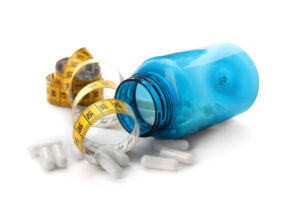Though SSRIs are the first choice for treating depression symptoms, they aren’t the only class of medications prescribed to treat depression. When researching treatment options, you’ll likely come across other types of antidepressants, such as SNRIs, or selective norepinephrine reuptake inhibitors.
While both these medication types are antidepressants, they work on different chemical messengers in the brain. As a result, SSRIs and SNRIs come with different side effects and affect patients differently.
In this post, we will compare Zoloft, an SSRI, to Effexor XR, an SNRI, to illustrate the similarities and differences between the two. Developing your knowledge of depression medication will help you make the most educated and informed choice regarding your depression treatment with your healthcare provider.
Are you considering starting or changing an antidepressant to help you better manage symptoms of depression? Klarity is here to help. Our affordable, convenient, and fast telemedicine services have helped 30,000+ people connect with depression specialists.
Discover what Klarity can do for you and schedule your appointment today. Once you do, you’ll be able to speak to a depression specialist in under 48 hours.
This article discusses suicide, suicidal ideation, and self-harm. If you or someone you know is experiencing suicidal thoughts or is in crisis, contact the Suicide Prevention Lifeline immediately at 800-273-8255.
| Zoloft | Effexor XR | |
|---|---|---|
| Drug Class | Selective serotonin reuptake inhibitor (SSRI) | Selective serotonin and norepinephrine reuptake inhibitor (SNRI) |
| Brand / Generic Status | Brand name for sertraline | Brand name for venlafaxine (extended-release formula) |
| Form(s) of the Drug | • Clear, peppermint-flavored liquid suspension • Color-coded tablets |
• Extended-release capsules |
| Standard Dosage | Liquid suspension • 20 mg of sertraline per dose Standard tablet dosages: • Green indicates 25 mg • Blue indicates 50 mg • Pinkish-red indicates 100 mg |
Extended-release capsules: • 37.5mg • 75mg • 150 mg |
| Conditions Treated | FDA-approved uses: • Major depression • Obsessive-compulsive disorder (OCD) • Panic disorder • Post-traumatic stress (PTS) • Premenstrual dysphoric disorder (PMDD) • Social anxiety disorder Off-label uses: • Autism (mood stabilizing) • Alcoholism • Eating disorders • Diabetic neuropathy • Dementia • Hot flashes • Generalized anxiety disorder (GAD) • Fibromyalgia • Migraines • Personality disorders • Tourette syndrome • Premature ejaculation |
FDA-approved uses: • Major depressive disorder • Panic disorder • Social anxiety disorder • Generalized anxiety disorder Off-label uses: • Post-traumatic stress disorder (PTSD) • Obsessive compulsive disorder (OCD) • Diabetic neuropathy • Hot flashes • Migraine prevention • Complex pain syndromes • Premenstrual dysphoric disorder (PMDD) • Attention deficit hyperactivity disorder (ADHD) • Fibromyalgia |
| Cost | Generic form (sertraline): • $4 to $25 for 30 days’ worth Brand-name: • $215 to $315 for a 30-day supply |
Generic form (venalfaxine): • $13 to $48 for a 30-day supply Brand-name: • $580 to $640 for a 30-day supply |
| Side-Effects | Common side effects: • Nausea or indigestion • Diarrhea or loose stool • Tremors or twitching • Decreased appetite and weight loss • Bruising and muscle aches • Decreased libido/trouble orgasming • Excessive sweating • Anxiety Serious side effects: • Heart arrhythmia • Bleeding and liver injury • Confusion and seizures • Suicidal thoughts • Changes in behavior • Serotonin syndrome |
Common side effects: • Headache, dizziness, drowsiness, tiredness • Anxiety, nervousness, restlessness • Sleep disturbances • Strange dreams • Changes in weight or appetite • Dry mouth, increased yawning • Increased sweating • Sexual dysfunction • Tremors • Heart racing • Blurred vision • Nausea and vomiting • Diarrhea or constipation Serious side effects: • Seizures • Blurred vision/seeing halos around lights • Difficulty breathing/chest tightness • Abnormal bleeding • Unnaturally stiff muscles • Low blood sodium—confusion, headaches and memory problems |
| Warnings For Use | Contraindicated conditions: • Pregnancy or breastfeeding • Liver problems • Epilepsy and seizure disorders • Glaucoma • Bipolar disorder • Thyroid disease Drug interactions: • Monoamine oxidase inhibitors (MAOIs) • Blood thinners • Antipsychotic and antiseizure medications • Alcohol—recreational and alcohol-based medications |
Contraindicated conditions: • Hypertension • Interstitial lung disease • Glaucoma • Hyponatremia, or SIADH • Seizure disorder • Liver disease • Kidney disease • Bipolar disorder Adverse drug interactions: • MAOIs • Blood thinners • Other antidepressants • Cimetidine • Tramadol • St. John’s Wort • Tryptophan • Weight-loss medicine • Mood disorder medication • Migraine medication |
Zoloft and Effexor XR
Zoloft and Effexor XR are both commonly prescribed to treat generalized anxiety disorder and major depressive disorder. Even though both medications are antidepressants and see widespread use, Zoloft and Effexor are different medication classes.
Both Zoloft and Effexor increase the brain’s access to neurotransmitters, but the significant difference between the two antidepressants is which neurotransmitters are affected. Zoloft is an SSRI. It only affects serotonin levels in the brain.
Effexor, on the other hand, is an SNRI. It increases the availability of both serotonin and norepinephrine in the brain. This difference has notable implications for how each drug works in the body.
What is Effexor XR?
Effexor (venlafaxine hydrochloride), an SNRI, is a class of antidepressants that increases the amount of norepinephrine and serotonin in the brain by blocking their reuptake in the synapses between neurons. Low levels of serotonin and norepinephrine are associated with an increase in various symptoms of anxiety and depression.
By making serotonin and norepinephrine more accessible in the brain, Effexor can treat the symptoms of depression and anxiety. Effexor also has other on-label and off-label uses and comes in various forms and doses. Effexor XR is the extended-release form of the medication, meaning the drug stays in your system longer, so you don’t have to take it as often.
Effexor Forms and Doses
Effexor is primarily administered orally via tablets or capsules and has extended-release (XR) options. The standard dose for an Effexor tablet is 150 mg once a day, but it is available in 25 mg, 37.5 mg, 50 mg, 75 mg, and 100 mg doses.
The standard dose for extended-release tablets and capsules is 75 mg, but 37.5 mg and 150 mg XR capsules and tablets are also available. This medication should be taken with water but doesn’t need to be taken with food.
Conditions Effexor XR Treats
The FDA approves Effexor to treat the symptoms of major depressive disorder, generalized anxiety disorder, and panic disorder. Healthcare providers also prescribe it as an off-label treatment for certain conditions.
Symptoms of Anxiety Effexor Can Treat
Effexor is prescribed to help treat or reduce the following symptoms of anxiety:
- Excessive anxiety, panic, or feelings of doom
- Irritability
- Restlessness
- Fatigue
- Muscle tension
- Difficulty concentrating
- Sleep disturbances
Symptoms of Depression Effexor Can Treat
Effexor is prescribed to treat or reduce the following symptoms of depression:
- Depressed mood
- Crying
- Loss of interest in activities that used to bring joy
- Feelings of worthlessness, guilt, hopelessness, and helplessness
- Fatigue
- Trouble concentrating
- Psychomotor agitation—or having nervous energy
- Psychomotor retardation—or feeling trapped in slow motion
- Changes in appetite
- Suicidal thoughts or behaviors
Off-Label Uses for Effexor
“Off-label” means that while the FDA has not conducted studies to approve using Effexor XR to treat these conditions, it has been shown to have positive effects. Healthcare providers may also prescribe Effexor to treat the following conditions “off-label.”
- Post-Traumatic Stress Disorder (PTSD)
- Obsessive-Compulsive Disorder (OCD)
- Premenstrual Dysphoric Disorder (PMDD)
- Attention-Deficit Hyperactivity Disorder (ADHD)
- Fibromyalgia
- Diabetic neuropathy
- Hot flashes
- Migraine prevention
- Complex pain syndromes
Effexor XR Costs
Costs for all types of medication can vary based on insurance coverage and other factors, so prices are approximate. Generally, the price of 30 capsules of 150 mg generic Effexor, known as venlafaxine, often ranges between $13 and $45.
Effexor XR Side Effects
SNRIs have potential side effects that potential users must be aware of before starting treatment. Most people do not experience severe side effects, and medical providers prescribe SNRIs because the benefits usually outweigh the potential risks. However, if you notice side effects that are ongoing or worsening, contact your medical provider
Here are the most commonly reported side effects of Effexor:
- Nausea
- Hypertension
- Yawning
- Constipation
- Sweating
- Abnormal sexual function
- Decreased libido
- Flatulence
- Dry mouth
- Loss of appetite
- Dizziness
- Insomnia
Effexor XR Warnings for Use
Do not stop taking Effexor XR as prescribed without consulting your healthcare provider, even if your symptoms improve. If you decide Effexor isn’t suitable for you, your medical provider will help you reduce your dose until you are no longer taking the medication.
Stopping the medication suddenly or missing several doses can lead to withdrawal symptoms, which include:
- Recurring symptoms of anxiety and depression
- Feeling dizzy
- Irritability
- Vomiting
- Nightmares
- Paresthesias
- Nausea
- Headaches
In people with bipolar disorders, antidepressants may cause a person to switch from a depressive phase into a manic phase.
Effexor may not be right for you if you have certain pre-existing conditions:
- Hypertension
- Interstitial lung disease
- Glaucoma
- Hyponatremia, or SIADH
- Seizure disorder
- Liver disease
- Kidney disease
- Bipolar disorder
Medications that increase serotonin levels in the brain may lead to a rare but serious condition called serotonin syndrome. This condition usually occurs hours after starting a medication that elevates serotonin levels. Symptoms of serotonin syndrome include:
- Agitation
- Trouble sleeping
- Confusion
- Rapid heart rate
- Dilated pupils
- Loss of muscle coordination
- High blood pressure
- Muscle rigidity
- Heavy sweating
- Diarrhea
- Headache
- Shivering
- Goosebumps
If you experience any of those side effects, including more severe ones like: high fever, tremors, seizures, irregular heartbeats, or unconsciousness, contact emergency medical services immediately and let your healthcare provider know.
Black Box Warning
Effexor XR, like other antidepressants, comes with a black box warning. This means that for some patients, Effexor increased thoughts of self-harm and suicide. Though this risk is greater in children, it can also happen in adults.
In the first few months of taking Effexor, monitor yourself for thoughts of self-harm and suicide and ask others to look out for unusual changes in your behavior, acting withdrawn, or increased depressive symptoms.
If you have thoughts of suicide, seek help immediately. You can contact the 988 Suicide and Crisis Lifeline 24/7.
Effexor XR Drug Interactions
Effexor should not be taken within two weeks of taking MAOIs or monoamine oxidase inhibitors. Common MAOIs include:
- Nardil (phenelzine)
- Parnate (tranylcypromine)
- Marplan (isocarboxazid)
- Azilect (rasagiline)
- Emsam (selegiline)
Other antidepressants, migraine medications, and certain pain medications can increase serotonin levels.
Effexor has been shown to increase the effects of blood thinners and other medications that increase the chance of bleeding:
- Advil
- Motrin
- Coumadin
- Aspirin
Before prescribing Effexor XR, your healthcare provider will review your medical history, any medications you’re currently taking, and other factors that may impact its usefulness in safely treating your depression or anxiety.
Licensed providers on Klarity provide personalized treatment. Find a provider that matches your needs and preferences.
What Is Zoloft?
Zoloft (sertraline) is an SSRI or selective serotonin reuptake inhibitor. It is a class of antidepressants that increase serotonin levels in the brain’s synapses. Because Zoloft elevates levels of serotonin, it is used to treat various mood disorders, including depression and anxiety. Additionally, Zoloft has various off-label uses.
Zoloft only elevates levels of serotonin and is different from Effexor, an SNRI, which boosts both serotonin levels and norepinephrine levels.
Zoloft Forms and Doses
Zoloft comes in two dosage forms — tablets and oral solutions. Zoloft is taken orally once per day, and starting doses range between 25 mg and 50 mg, depending on the severity of the condition being treated. The standard daily dosage ranges between 50 mg and 200 mg. Unlike Effexor, which can be taken without food, Zoloft is best absorbed when taken with food.
When taken as an oral solution, Zoloft must be mixed with another liquid before ingesting.
Conditions Zoloft Treats
Zoloft is FDA-approved to treat major depressive disorder (MDD), obsessive-compulsive disorder (OCD), panic disorder, post-traumatic stress disorder (PTSD), social anxiety disorder, and premenstrual dysphoric disorder (PMDD).
Symptoms of Anxiety Zoloft Is Prescribed to Treat
Zoloft has been shown to help treat or reduce the following symptoms of anxiety:
- Excessive anxiety, panic, or feelings of doom
- Irritability
- Restlessness
- Fatigue
- Muscle tension
- Difficulty concentrating
- Sleep disturbances
Symptoms of Depression Zoloft Is Prescribed to Treat
Zoloft has been prescribed to help treat or reduce the following symptoms of depression:
- Depressed mood
- Crying
- Loss of interest in activities that used to bring joy
- Feelings of worthlessness, guilt, hopelessness, and helplessness
- Fatigue
- Trouble concentrating
- Psychomotor agitation—or having nervous energy
- Psychomotor retardation—or feeling trapped in slow motion
- Changes in appetite
- Suicidal thoughts or behaviors
Off-Label Uses for Zoloft
Medical providers prescribe Zoloft as an off-label treatment for the following conditions:
- Premature ejaculation
- Binge eating disorder
- Bulimia nervosa
- Body dysmorphic disorder
- Generalized anxiety disorder (GAD)
Zoloft Costs
For generic Zoloft (sertraline), 30 100mg tablets generally cost between $7 and $25. Prices may vary due to many factors, including insurance coverage.
Zoloft Side Effects
SSRIs often have side effects that patients need to be aware of before beginning treatment. In most people, the side effects are not severe and dissipate with time. The many benefits of Zoloft often outweigh potential side effects. Discuss whether or not the side effects are worth taking Zoloft with your healthcare provider.
Common side effects of Zoloft include:
- Diarrhea
- Confusion
- Hallucinations
- Tremor
- Disorder of ejaculation
- Fatigue
- Female sexual dysfunction
- Nausea
- Sweating
- Dry mouth
- Fainting
- Lightheadedness
Zoloft Warnings for Use
Like Effexor, Zoloft also comes with a black box warning. There is a chance that Zoloft can cause an increase in suicidal thoughts and thoughts of self-harm in both children and adults. Though rarer in adults, patients need to monitor their depressive symptoms for increases in suicidal and self-harm ideation.
If taking Zoloft, be sure to monitor for an increase in the following symptoms:
- Increased hostility, aggression, and irritability
- Increased anxiety
- Unusual changes in behavior
- Manic behavior
- Insomnia
- Panic attacks
- Increase or emergence of suicidal thoughts
- Increase or emergence of thoughts of self-harm
If you experience any of these severe symptoms, seek medical help immediately. If you have thoughts of suicide, contact the 988 Suicide and Crisis Lifeline.
Zoloft Drug Interactions
Like Effexor, Zoloft should not be taken within two weeks of taking MAOIs or monoamine oxidase inhibitors. Because Zoloft increases serotonin levels in the brain, there is an increased risk of developing serotonin syndrome if a person also takes other medication that elevates serotonin levels.
Serotonin syndrome is rare and usually occurs when a person starts treatment that elevates serotonin levels.
Which Medication Should I Take?
SSRIs and SNRIs are different types of antidepressants. One isn’t inherently better than the other. However, each will interact with an individual’s unique body chemistry in different ways. Some people will be more receptive to the effects of Zoloft over Effexor XR and vice versa.
If you have an immediate family member who has had success with Zoloft or Effexor, it can indicate that the medication may work well for you. It’s important to discuss your medical history and any medications or supplements you are taking with your healthcare provider.
Your healthcare provider will review your symptoms, medical history, and other important factors to determine the right course of treatment for your anxiety or depression.
Klarity Makes It Easy To Get Anxiety and Depression Treatment Online
Klarity has helped over 30,000 Americans receive fast, affordable, and accessible anxiety and depression treatment online through our telehealth services.
You deserve an empathetic provider who can prescribe the right medication for you, if applicable. To get care for anxiety and depression on your terms, schedule an appointment on Klarity.
- Klarity is fast. There are no lengthy waiting periods to be seen by a healthcare provider, and appointments are available within 48 hours of taking our online assessment.
- Klarity is convenient. No missed time at work. No lengthy commutes. Treatment from the comfort of your home. Prescriptions delivered to your pharmacy.
- Klarity is affordable. No hidden fees. No subscription fees. Pay as you go. No insurance needed.
Frequently Asked Questions About Zoloft and Effexor XR
Here are some questions Klarity’s healthcare partners often receive about Zoloft and Effexor XR.
Can I drive when taking Zoloft or Effexor XR?
Dizziness, confusion, and sedation are all potential side effects of Zoloft and Effexor XR, especially when you first start taking the medication. Before driving, operating heavy machinery, or engaging in behaviors that require coordination, wait and see how either drug affects you.
Many people do not experience serious side effects, and those that do report side effects subsiding after a few days or weeks. It’s still smart to wait and see if you experience side effects that would make driving dangerous.
Your healthcare provider will discuss potential side effects before prescribing the medication.
Does Zoloft or Effexor XR harm pregnancy?
SSRIs like Zoloft are generally considered safe for women to take during pregnancy. However, according to the CDC, pregnant women who use Effexor early in pregnancy have a slightly increased chance of giving birth to babies with congenital disabilities, including heart defects, brain and spinal defects, cleft lip, and cleft palate, among others.
Other studies indicate a slightly increased risk of premature birth for babies whose mothers were taking both SSRIs and SNRIs.
Your medical provider will work with you to find the medication that will safely treat your anxiety or depression.
Can I drink alcohol while using Zoloft or Effexor XR?
Drinking alcohol while on Zoloft or Effexor may increase the risk of unwanted side effects, including:
- Dizziness
- Headaches
- Nausea
- Diarrhea
- Drowsiness
- Depression
- Suicidal thoughts
- Anxiety
Drinking alcohol while on antidepressants is not recommended.
Does it matter what time of day I take Zoloft or Effexor XR?
It doesn’t typically matter what time of day either Zoloft or Effexor is taken. However, sleepiness and drowsiness are potential side effects of both.
If you experience these side effects, taking the medication at night may make more sense. Whether you take your medicine in the morning or at night, it is recommended that you consistently take it at the same time each day.
Your healthcare provider will discuss when it’s best to take your medication.
Can Zoloft or Effexor XR make anxiety worse?
For some patients, SSRIs and SNRIs may worsen depression and anxiety symptoms. If the worsening symptoms do not subside, you must talk to your health provider about weaning you off the medication. Remember, never suddenly stop your antidepressant—this can lead to withdrawal symptoms.
What’s better for anxiety and depression? Zoloft or Effexor XR?
Both medications are similarly effective at treating the symptoms of anxiety and depression. However, some studies show that Effexor XR may be slightly advantageous for severely depressed individuals. This could be due to the fact that Effexor XR works on two neurotransmitters as opposed to Zoloft’s one.
Your healthcare provider will work with you to determine the best course of treatment for your anxiety or depression.







